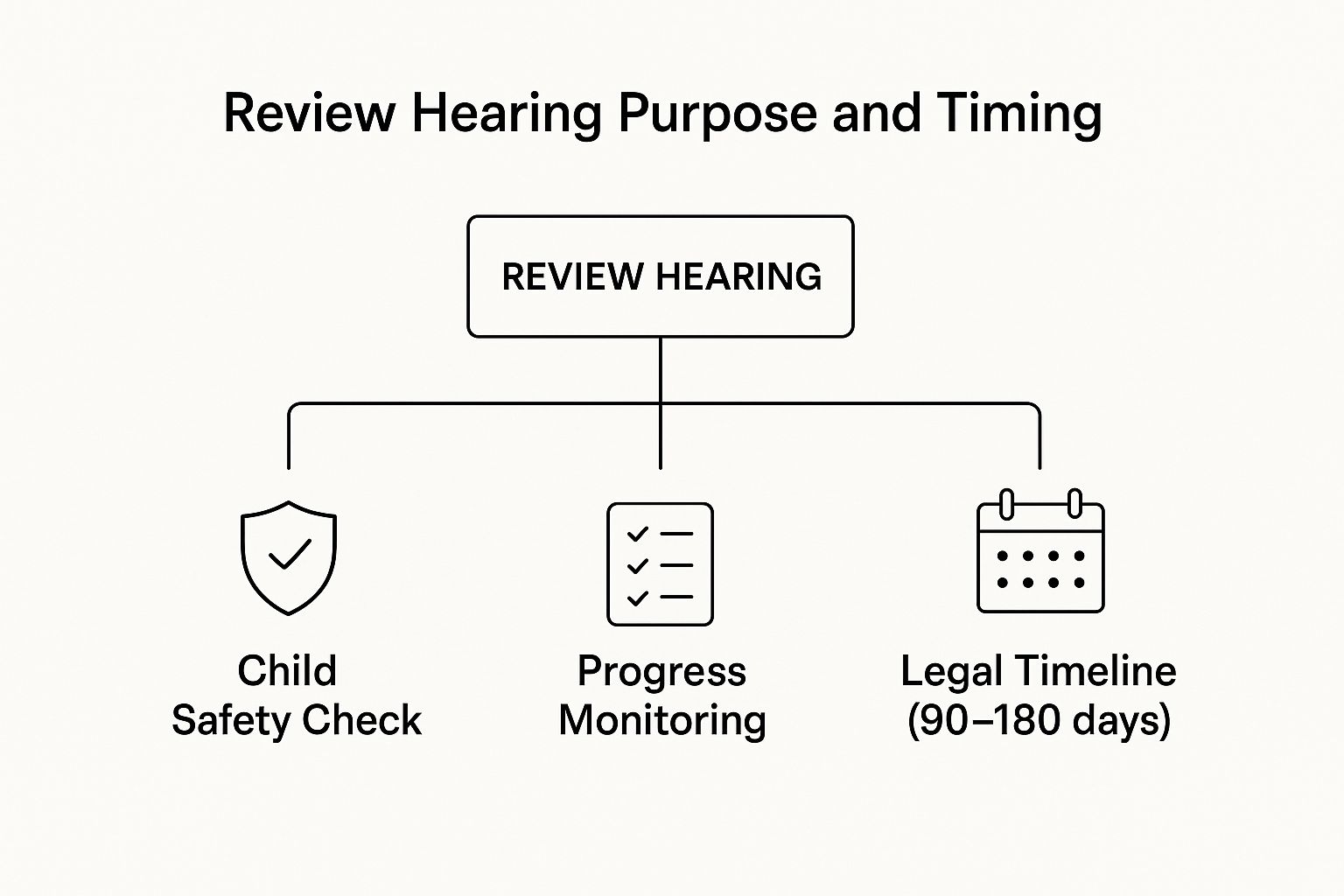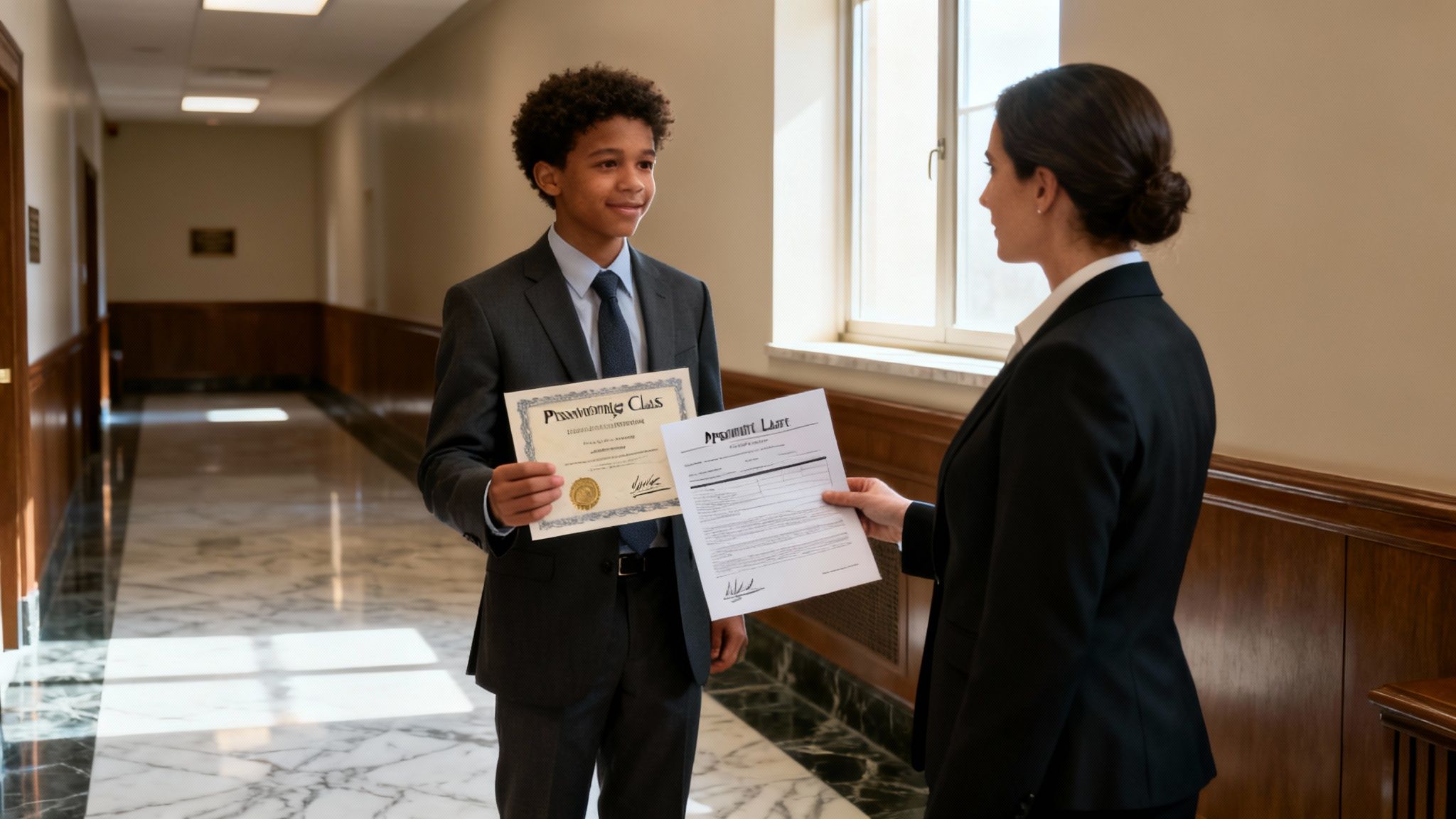When Child Protective Services (CPS) enters your life, the world can suddenly feel overwhelming. The legal jargon, endless court dates, and constant fear for your children's future are enough to make any parent feel lost and powerless. You've likely heard the term "review hearing" mentioned, and the uncertainty of what that means for your family can be terrifying.
Let's be clear: a review hearing is not a final trial to terminate your parental rights. Instead, think of it as a crucial checkpoint where a judge evaluates the progress of your CPS case. It's a formal progress report meeting, mandated by the Texas Family Code, designed to ensure everyone is actively working toward a safe, permanent home for your child. It is your opportunity to show the court your commitment.

What's Your Role in a CPS Review Hearing?
Imagine you're running a marathon you never signed up for. A review hearing is like a mandatory water station. It’s not the finish line, but it’s a vital chance for the race officials (the judge) to see how you’re doing, check if you need different support (services), and make sure you’re still on the right path toward the ultimate goal: reunification with your child.
Once you understand its purpose, your perspective can shift from fear to empowerment. This hearing isn't about punishment; it's about showcasing your progress.
The procedures for these hearings are detailed in the Texas Family Code, specifically in Chapters 262 and 263. The court's primary goals during this check-in are to:
- Assess your child's safety and well-being in their current placement.
- Evaluate your progress on the court-ordered Family Service Plan.
- Review the services CPS is providing to you and your child to ensure they are helpful.
- Determine the next steps needed to move the case toward a permanent, stable home for your child.
These hearings are very different from other court dates, like the initial removal hearing or the final trial. For a closer look at how they differ, you can find helpful information in our guide on how to prepare for a Texas CPS status hearing.
Navigating these complexities requires an attorney who not only understands the law but also understands what you're going through. At The Law Office of Bryan Fagan, we are committed to guiding you through every checkpoint with clarity and compassion, ensuring your progress is presented effectively and your rights are protected.
What’s the Point of a Review Hearing? And When Do They Happen?
So, why does the court keep scheduling these hearings, and when can you expect yours? At its core, a review hearing has a simple but critical purpose: to ensure your child is safe and to keep the case moving steadily toward a permanent, stable home. It’s the court's main way of holding everyone—including CPS—accountable.
Think of it as a scheduled progress report for your case. The judge needs to see that CPS is providing the services your family needs. Just as importantly, they need to see that you're making real, meaningful progress on your court-ordered service plan. This isn't a test designed to trip you up; it's your chance to show the judge you're doing the hard work to bring your family back together.
Understanding the Legal Clock
Texas law is very specific about the timeline for these check-ins. This is to prevent children from languishing in foster care without resolution. Under Chapter 263 of the Texas Family Code, the very first review hearing must take place within 90 days of the judge signing the temporary order that placed your child in CPS custody.
After that first hearing, the court will hold subsequent review hearings at least once every 180 days—roughly every six months. This regular schedule ensures consistent oversight and keeps the case on track.
This infographic breaks down the main functions of these crucial court dates.

As you can see, every hearing circles back to three key things: your child's safety, your progress, and adhering to a strict legal timeline to achieve permanency. These hearings aren't just a formality. They are the primary tool the court uses to move cases toward a final, stable outcome for children.
Each hearing you attend builds on the last one, creating a complete record of your efforts. Knowing what to expect is half the battle, and you can get a deeper look by understanding Texas CPS status reviews and permanency hearings in our parent's guide. When you show up prepared, you're sending a powerful message to the judge that you are serious about reuniting your family.
Who Is in the Courtroom and What to Expect
Let's be honest: walking into a courtroom can be one of the most stressful parts of a CPS case. The formal procedures and unfamiliar faces can feel incredibly intimidating. But once you understand who everyone is and what their role is, much of that anxiety can fade, allowing you to focus on what truly matters: your child.
Think of the courtroom as a highly structured meeting where every person has a specific job. Your job is to demonstrate to the most important person in that room—the judge—that you are committed to safely reuniting your family.

The Key People in the Room
During your review hearing, you'll see a handful of key players. Knowing who they are and their purpose is the first step toward feeling more in control.
Here’s a breakdown of who you can expect to see and what their role is.
| Key Participants in a CPS Review Hearing and Their Roles | |
|---|---|
| Participant | Role in the Hearing |
| You and Your Attorney | You are the most important witness to your own progress. Your attorney is your advocate and your voice, presenting evidence of your hard work and fighting to protect your parental rights. |
| The Judge | The ultimate decision-maker. The judge listens to all updates and reviews evidence to decide the next steps for your case, based on your child's best interest. |
| The CPS Caseworker | Your caseworker reports to the court on your progress with the service plan, the child's well-being, and provides recommendations. |
| The State's Attorney (AAG) | This lawyer, an Assistant Attorney General, represents CPS. They present the agency's official position and recommendations to the judge. |
| Your Child's Attorney (Ad Litem) | Your child is appointed their own lawyer, called an attorney ad litem. Their sole job is to represent what they believe is in your child's best interest. |
Once you can put a role to each face, the courtroom begins to feel less like a scary, unknown place and more like the structured forum it is.
The Typical Flow of the Hearing
While every case is unique, most review hearings follow a predictable rhythm. Knowing this sequence can help calm your nerves and keep you focused.
Here’s the general flow:
- The Judge Calls the Case: The hearing officially begins when the judge announces your case name and number.
- Attorneys Provide Updates: Each lawyer gives a brief update. Typically, the CPS attorney goes first, followed by the child's attorney, and then your attorney.
- You Show Your Progress: This is your moment. Through your attorney, you will present all the hard work you’ve done—certificates from completed classes, proof of clean drug tests, or pay stubs and a lease showing stable employment and housing.
- The Judge Asks Questions: The judge will likely ask questions to clarify information or address concerns. It is crucial to answer honestly and directly.
- The Judge Makes New Orders: After hearing from everyone, the judge will make a ruling and issue new court orders that will guide the next phase of your case.
This structure transforms the courtroom from a place of fear into an organized setting where you can actively demonstrate your commitment to your family.
How One Parent Turned Their Case Around
To truly understand the power of a review hearing, let’s talk about a father I’ll call David. When his CPS case began, he was terrified. His children were removed from his home due to concerns about an unsafe environment, and David felt his world had collapsed.
He was given a court-ordered service plan that felt like an impossible mountain to climb: parenting classes, finding a new, stable home, and maintaining steady employment. That first review hearing loomed over him, and he was convinced the judge would only see the mistakes that brought him there.

Taking Proactive Steps
Instead of letting fear paralyze him, David decided to take control of his story. He sat down with his attorney, and together, they mapped out a clear strategy. This wasn't just about checking boxes; it was about showing the court his unwavering dedication to his kids.
Here’s what David did to prepare:
- He documented everything. He didn't just attend parenting classes; he saved every certificate and kept a perfect attendance log.
- He gathered proof of stability. David didn't just tell the judge he found a new place; he brought his signed apartment lease and recent pay stubs to his lawyer.
- He communicated and prepared. He met with his lawyer well before the hearing to review all the evidence and practice answering the judge’s potential questions calmly and honestly.
A review hearing is your opportunity to show the court that the person who started this case is not the same person standing before them today. It is your chance to demonstrate growth, responsibility, and unwavering dedication to your children.
On the day of the review hearing, David's attorney presented a clear, organized picture of his progress. The judge saw hard evidence: the lease, the pay stubs, the certificates. It painted a powerful image of a father who was taking this process with the seriousness it deserved. The judge, seeing this tangible effort, ordered increased visitation, a huge step toward reunification.
David’s story is a perfect example of what a review hearing is for. It is your stage to change the narrative of your case. With dedication and the right preparation, you can turn this court date into a significant step toward bringing your family back together.
Understanding the Possible Hearing Outcomes
After the updates and arguments, the judge makes a decision that will chart the course for the next phase of your case. It’s crucial to understand the potential outcomes. Remember, a review hearing is a checkpoint, not the final destination, and the judge's orders will reflect the progress—or lack thereof—that has been presented.
Ultimately, the rulings are directly tied to the effort and commitment you can prove you’ve made.
Potential Rulings from the Judge
If you’ve demonstrated significant, consistent progress on your service plan, the judge will take notice. This is the best-case scenario and can lead to very positive changes.
- Continuation of Your Plan: If you are in compliance and things are moving forward, the judge may simply order the current service plan to continue.
- Increased Visitation: As a direct reward for your hard work, the judge might grant you more time with your children, including unsupervised visits. This is a critical step toward reunification.
However, if the court feels you are not making sufficient progress, or if new concerns have arisen, the orders will be different.
- Modified Service Plan: The judge could add new services to your plan—such as different counseling or assessments—to better address the core issues of the case.
- Considering Other Options: Per Texas Family Code Chapter 263, if there is a serious lack of progress over time, the court is legally required to consider other permanent options for your children. This is a grave development that can move a case toward the goal of termination of parental rights, as outlined in Chapter 161.
No matter the outcome, your first step is to discuss the new orders with your attorney. You must fully understand every requirement and deadline to take control of what happens next.
If the hearing doesn't go your way, it can feel devastating, but it is not the end. It's vital to know your options. While an appeal is a possibility, often the best path forward is to double down on your efforts. Understanding why CPS cases get dismissed can provide hope, but the most powerful tool you have is your continued, documented commitment to your service plan. As your attorneys, we can provide you with essential guidance during this critical time. Your future actions will be what determines the outcome of your case.
Got Questions About Your Texas CPS Review Hearing? We’ve Got Answers.
When you’re in the middle of a CPS case, your mind is likely filled with questions and fears. It's a confusing and terrifying time, but getting clear, straightforward answers is the first step toward regaining your footing. We hear the same worries from Texas parents every day, so let's tackle some of the most common questions head-on.
Knowing what’s coming and what the court expects is how you begin to take back control of your family’s future.
Can My Kids Come Home After a Review Hearing?
Yes, it is absolutely possible for a judge to order a "monitored return," allowing your children to come home with you after a review hearing. For any parent in a CPS case, this is the goal you are working tirelessly toward.
This outcome typically occurs later in the case, only after you have demonstrated significant and consistent progress on your service plan. The judge must be convinced that the issues that brought CPS into your life have been resolved and that your home is now a safe and stable environment. Whether this happens depends entirely on the specific facts of your case and the evidence of your hard work.
What Happens If I Miss My Review Hearing?
Attending every court date is non-negotiable. Missing a hearing is one of the most damaging mistakes a parent can make in a CPS case. A judge will almost certainly interpret your absence as a lack of seriousness or, worse, an avoidance of your responsibilities.
The consequences can be immediate and severe. The judge could suspend your visitation or, seeing a lack of engagement, move the case more quickly toward termination of your parental rights. If you have a true, verifiable emergency, you must contact your attorney immediately so they can notify the court and ask for the hearing to be reset.
Preparation is your single greatest tool for success. Being organized and proactive shows the court you are serious about doing whatever it takes to reunite your family and are an active participant in your own case.
How Can I Best Prepare for My Hearing?
Walking into court prepared can make all the difference. Your strategy should be focused on three simple, powerful steps:
- Communicate with Your Lawyer: Meet with your attorney well before the hearing date. Ensure they have copies of every document and are fully aware of all the progress you've made. There should be no surprises.
- Gather Your Proof: Collect every piece of paper that proves you are doing the work. This includes class completion certificates, attendance sheets, recent pay stubs, your lease agreement, and support letters from counselors, sponsors, or employers.
- Anticipate Questions: Put yourself in the judge's position. What might they or the CPS attorney ask you? Prepare honest, direct answers that show you are taking accountability and are focused on moving forward.
A CPS review hearing is a pivotal moment, but you do not have to face it alone. The fear and confusion you're feeling are valid, but with the right guidance, you can navigate this challenge. The dedicated attorneys at The Law Office of Bryan Fagan have stood beside countless Texas parents facing these exact hearings. If you have a review hearing on your calendar and need an experienced, compassionate advocate fighting for you, contact us today for a free consultation. Let's discuss your case and build a strategy to protect your family’s future. Visit us at https://texascpslawyer.net to get started.




